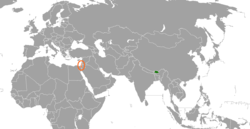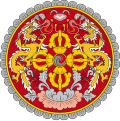 | |
Bhutan | Israel |
|---|---|
Bhutan and Israel established formal relations in December 2020 with the signing of an agreement between the respective countries' ambassadors in India. [1] Israel is the 54th country with which Bhutan has established ties. [2] According to reports, the two countries have had a strong unofficial relationship since 1982, [3] and have been in secret negotiations for several years before the formal announcement. [4]

